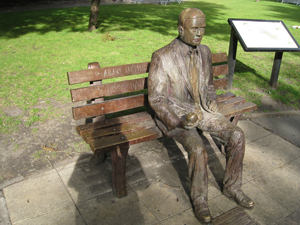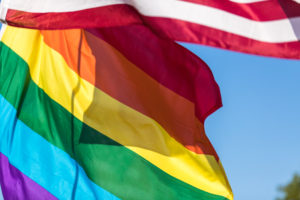Queen Finally Pardons the ‘Father of Computer Science’ Convicted For Homosexuality
Alan Turing, the British computer scientist who helped crack the Nazi Enigma code and invented "one of the world's first stored-program computers," was sentenced to chemical castration more than 60 years ago on charges of "gross indecency." Fifty-nine years after his death, he has received a posthumous royal pardon.
, the British computer scientist who helped crack the Nazi Enigma code and invented “one of the world’s first stored-program computers,” was sentenced to chemical castration more than 60 years ago on charges of “gross indecency.” In an attempt to punish him for being gay, Turing was forced to undergo a barbaric treatment consisting of several injections that led to impotence and breast growth or otherwise serve time in prison. In 1954, after surviving the horrifying process and being stripped of his security clearance, the computer scientist was found dead of cyanide poisoning in what’s been called an “apparent suicide” though those close to Turing maintain it was an accident. Human rights campaigner Peter Tatchell has stated he would like a full investigation into the scientist’s death since there is a possibility he was “killed by the security services [since] he was regarded as a high security risk.”
Not only did Turing assist the British in fighting against the Nazis during World War II with his mathematical skills to break German codes, but his ideas and inventions have played roles in creating much of modern technology. Though his ACE (Automatic Computing Engine) was never built, the design was used as the foundation of many computers made subsequently and the so-called Turing Test is still used to “judge artificial intelligence through conversation.”
On Dec. 24, decades after Turing’s grossly inhumane sentence, a posthumous royal pardon issued by Queen Elizabeth II went into effect.
Technology news website The Verge writes:
The pardon is an apology to one of the 20th century’s most influential scientists. Turing’s work laid the foundations for modern computing, and his codebreaking efforts at the British Bletchley Park campus during World War II were so advanced that some details of his research were only released in 2012.
According to the BBC, however, the process to clear the father of computer science’s name has been long and arduous:
Glyn Hughes, the sculptor of the Alan Turing Memorial in Manchester, said it was “very gratifying” that he had finally been pardoned.
“When we set out to try and make him famous – get him recognised – it was really difficult to collect money,” he said.
“None of the big computer companies would stump up a penny for a memorial. They perhaps would now – we’ve come a very long way.”
But he said he was “not entirely comfortable” that Turing had been pardoned while thousands of other gay men had not.
“The problem is, of course, if there was a general pardon for men who had been prosecuted for homosexuality, many of them are still alive and they could get compensation.”
In December 2011, an e-petition was created on the Direct Gov site that asked for Turing to be pardoned. It received more than 34,000 signatures but its request was denied by the then justice secretary, Lord McNally, who said Turing was “properly convicted” for what was at the time a criminal offence.
Prior to that in August 2009, a petition was started to request a pardon. It won an official apology from the prime minister at the time, Gordon Brown, who said the way Turing was persecuted over his homosexuality was “appalling”.
—Posted by Natasha Hakimi
Your support matters…Independent journalism is under threat and overshadowed by heavily funded mainstream media.
You can help level the playing field. Become a member.
Your tax-deductible contribution keeps us digging beneath the headlines to give you thought-provoking, investigative reporting and analysis that unearths what's really happening- without compromise.
Give today to support our courageous, independent journalists.



You need to be a supporter to comment.
There are currently no responses to this article.
Be the first to respond.